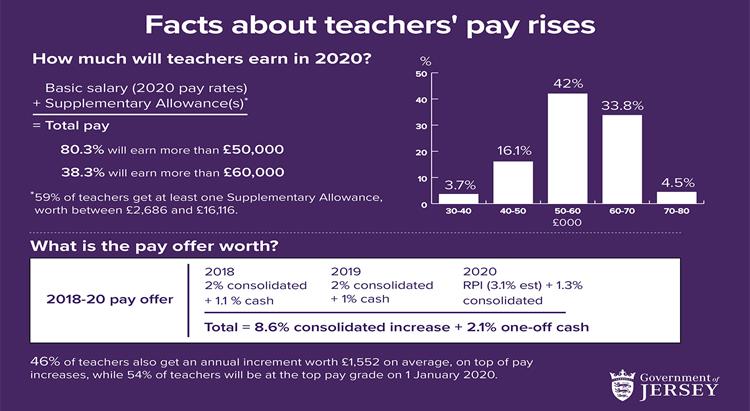01 May 2019

Government negotiators have been meeting with the NASUWT and NEU teaching unions in an attempt to resolve the ongoing disputes and to avoid further industrial action.
Two full days of talks took place on 26 and 30 April, under the auspices of the Jersey Arbitration and Conciliation Service, where a breakthrough was made with the NASUWT, which represents 500 teaching staff.
NASUWT and the Government have agreed to detailed discussions on educational reform, which would generate savings to be shared with teachers through a higher pay offer from 2020, as well as strengthen standards across our schools.
By funding further increases via sharing savings, the higher offer will be affordable and sustainable, and will not breach the financial limits agreed by the States Employment Board for 2018-20 pay rises. The NASUWT and negotiators will meet again on 7 May.
Chief Minister, Senator John Le Fondré, said: “I am encouraged by the positive approach being taken by the biggest teaching union and the States Employment Board has instructed our negotiating team to work with NASUWT to review all aspects of teaching arrangements and secure an improved pay offer, funded by savings.
“There is still a lot of hard work to do to deliver on this ambitious review, but there is clear willingness from SEB and from NASUWT to end the dispute. This will also include renewing and strengthening the Partnership Agreement with NASUWT, which provides a forum for discussion and agreement on further ways to enhance educational achievement in all our schools and colleges.”
NEU, which represents 208 members, continue to seek improvements to the current pay offer, but have stated that they will not take part in the discussions about educational reform and securing higher pay rises through sharing savings. NEU have also confirmed their intention to go ahead with the two-day strike scheduled for 7 and 8 May.
The Chief Minister added: “We are extremely disappointed at NEU’s stance, which is deliberately harming our children’s education and causing cost and inconvenience to parents and employers. Given we have agreed a positive way forward with the NASUWT, we can only conclude that NEU are not serious about seeking resolution.
“SEB feel that the proposals we have set out to resolve the pay disputes are fair and reasonable and have a good chance of leading to a comprehensive package which all parties, including teachers, will find acceptable.”
Current pay offer
The current three-year pay offer for teachers is worth 8.6% in consolidated (pensionable) pay rises, plus 2.1% in one-off cash payments. In 2020, the offer is worth RPI plus 1.3% (with RPI currently expected to be 3.1%).
This means that from 1 January 2020 the total full-time equivalent salary received by teachers will be between a minimum of £33,692 and a maximum of £72,868 (average = £56,757).
More than half of all teachers also receive at least one Supplementary Allowance, which will be worth between £2,686 and £16,116 in 2020. These are paid on top of their basic salary.
Teachers’ total pay is therefore their basic salary plus any allowances they receive.
Adding these together means 80.3% of teachers earn £50,000 or more a year, and 38.3% earn £60,000 or more a year in total pay (full-time equivalent).
In addition to annual pay awards, teachers who are not yet at the maximum of their pay scale also receive incremental pay progression, worth £1,552 on average in 2020.
Under the terms of the current three-year pay offer, again before any further negotiated benefits, from 1 January 2020:
- 44.3% of teachers will receive a consolidated increase in basic pay of 14.6%
- 4.8% of teachers will receive a consolidated increase in basic pay of 13.0%
- 5.1% of teachers will receive a consolidated increase in basic pay of 10.7%
- 45.8% of teachers are at the maximum of the pay structure and therefore will receive a consolidated increase in basic pay of 8.6%
- on top of this, all teachers have received one-off lump sums totalling 2.1% of their pay. In cash terms this means the lowest offer is 10.7% and the highest offer is 16.7%
- for reference, the prevailing (September) RPI figure over 2018/19/20 is forecast to be 10.9% (assuming September 2019 RPI figure of 3.1%)